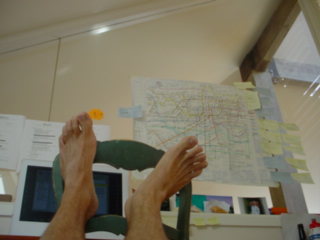
As you can see from above image I’m still largely looking at the ceiling. Here’s my promised list of best books about the future – not ranked.
Future Shock by Alvin Toffler
The Next 100 Years by George Friedman
Footprints of the Future by Richard Neville
Faster by James Gleick
Tomorrow’s People by Susan Greenfield
The 500 Year Delta by Jim Taylor and Watts Wacker
The Clock of the Long Now by Stewart Brand
Futurewise by Patrick Dixon
The World is Flat by Thomas Friedman
When Things Start to Think by Neil Gershenfeld
Envisioning the Next 50 Years Bruce Sterling
The Catalog of Tomorrow by Andrew Zoli
More than Human by Ramez Nan
Silent Spring by Rachel Carson
Future Perfect by Robyn Williams
Future Hype by Bob Seidensticker


